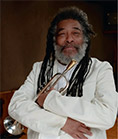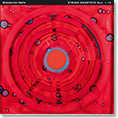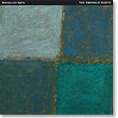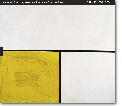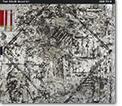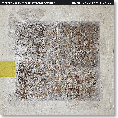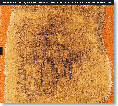REFLECTIONS
Free improvisation is an art form that may seem deceptively easy. Why not throw away all your inhibitions and every restrictive rule and just go for it? Often, especially when listening to younger musicians playing so-called "free jazz", you get the feeling that this is precisely what´s going on. The real requirements of artistic creation are, of course, quite different. There can be no meaningful creative freedom without a deep understanding of the music´s history and an ability to communicate with other musicians.
On this recording, we can hear three masters, indeed three legends, of free improvisation who perfectly demonstrate this. The three men were all born in the 1930s and, despite their different backgrounds and personal histories, have much in common. Most importantly, they share an understanding of what went on before their time, including a knowledge of and appreciation for the various older styles of jazz, and know how to use it in their music. Still, there is no nostalgia here. The music is fresh and new.
This recording can be seen as a companion to "Strings Revisited" (TUM CD 003), which featured a trio comprised of Juhani Aaltonen exclusively on tenor saxophone, Reggie Workman on bass and Andrew Cyrille on drums together with The Avanti! Chamber Orchestra conducted by Henrik Otto Donner, the composer of all the music included on that recording. While "Strings Revisited" had a chamber orchestra playing fully notated music virtually all the time and, therefore, restricted Aaltonen, Workman and Cyrille into improvising within the space provided by the arrangements, the music on this recording is improvised within only a loose compositional framework that leaves much freedom to the musicians. Composed themes are used only as a starting point and, with the exception of Andrew Cyrille´s composition "The Navigator", there are no pre-conceived arrangements. Reggie Workman says the following of this recording:
"What a pleasure to hear Mr. Aaltonen in this context again. Some twenty years passed between his last recordings as a leader within the musical realm of free improvisation and the recent releases by TUM Records, including his reunion with Henrik Otto Donner on "Strings Revisited" to which Andrew Cyrille and myself had the pleasure of contributing.
Our acquaintance also goes back to the early 1980s, when we had the opportunity to work together on a few musical projects with the late percussionist/composer Edward Vesala.
Although Juhani may have been doing other things, his sound and concept prove that he has not missed much of the current trends of personal expression. Listening to Juhani´s sound, one can clearly recognize that he has heard and respects the great improvisers who have made significant contributions to today´s music. Yet, he stands on his own.
All you need to do is open your ears and your mind and I´m sure that you will enjoy this journey into Juhani´s world."
The music on this recording was one result of a week of intensive collaboration. After Workman and Cyrille arrived in Finland on the morning of Monday, November 18, 2002, rehearsals both by the trio alone and by the trio with Avanti! commenced. In addition to performing a separate trio segment in each of the concerts organized on Thursday and on Friday of the week, the trio also played a one-night engagement at the Umo Jazz Club in Helsinki on Wednesday. Consequently, by the time of the studio session on Saturday, the members of the trio had come to know each other´s playing well and the recording session itself was easily completed. However, because of the intensity of some of the live performances, a decision was made to include on this CD a live version rather than a studio version of "Supplications", a Juhani Aaltonen composition that was first performed during these sessions.
Prior to this recording, Aaltonen and Workman had played together as members of the late Edward Vesala´s group during certain projects that brought Workman to Finland in the early 1980s. Aaltonen and Workman, with Vesala on drums, had also recorded together on Juhani Aaltonen´s "Prana" (Leo Records), a live recording that has become a much-sought-after collectors´ item and an example of Aaltonen´s "free" playing that is treasured by many younger musicians. In addition, Workman and Cyrille have frequently performed together over the decades and have intensified their cooperation in recent years through their participation in Trio 3 (with saxophonist Oliver Lake), the Roswell Rudd/Archie Shepp group and a number of other projects. Consequently, there was much common history that preceded the sessions in November 2002 and contributed to the music. The three musicians were playing as a true trio in open communication with each other, feeding off each other´s playing, rather than as an ad hoc group just thrown together in the studio.
A comparison between "Prana" and this recording is enlightening. Although Aaltonen has not lost any of the power demonstrated on the earlier recording, a newfound maturity and tendency for reflection have replaced some of the anguished urgency. This observation is important for understanding the nature of free improvisation even more broadly. A young musician may be able to impress with his technical brilliance or his boundless energy. However, this alone is not enough just as it is not enough to just learn the vocabulary in order to write a masterpiece. Only through years of experience - through life and practice - do the words begin to have a meaning. The same applies to free improvisation. There is no question that these three giants of their respective instruments have both mastered the vocabulary of free improvisation and learned to use it to create mature art. It is a great shame that today´s music industry fails to recognize the value of artists such as Aaltonen, Workman and Cyrille and, instead, always seems to favor youth over maturity because it is perceived to have greater commercial potential.
This recording also serves as an example of what a paradoxical concept the term "new music" has become. In jazz, as in many other areas of music and other art, the 1960s were a period of almost boundless creativity. Each of the three musicians on this recording entered the world of improvised music in the early 1960s and they all became known as flag bearers of the "new music" of that decade. Now, some forty years later, their music continues to sound fresh and creative when compared to the music of the neo-conservatives of our day. Time, and maybe also age, has become a relative concept. Aaltonen, Workman and Cyrille continue to create "new music" even as they each approach their 70th birthday in the next few years while many artists less than half their age create music that is "old" at its inception. Could it be that they have found a fountain of youth? In their music, no doubt.

